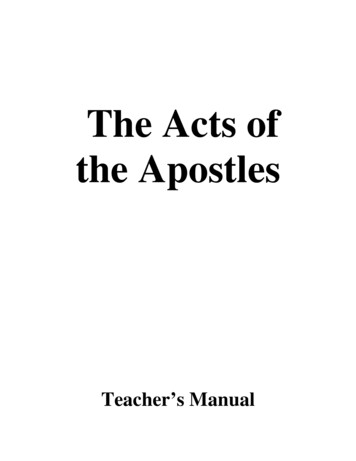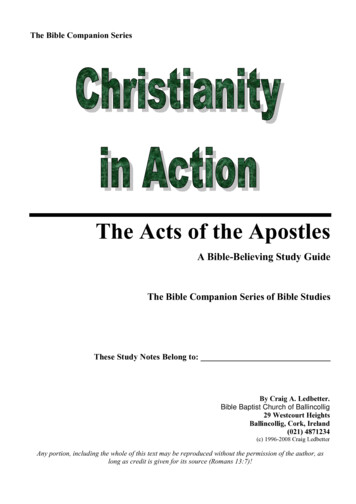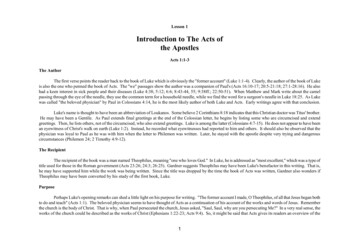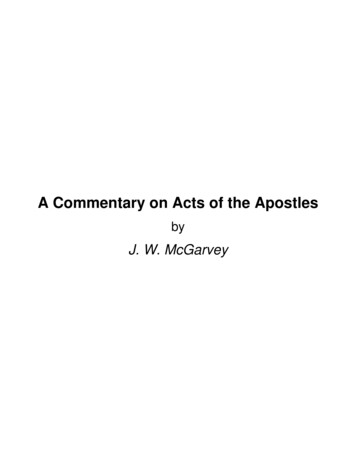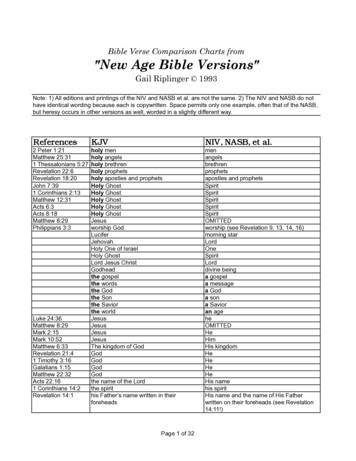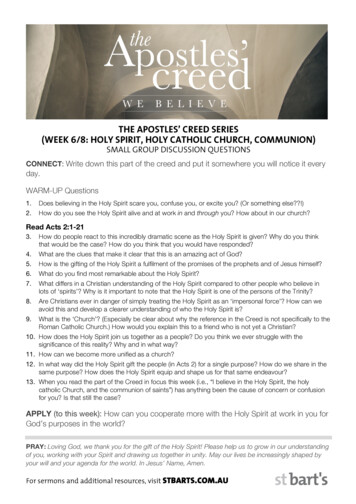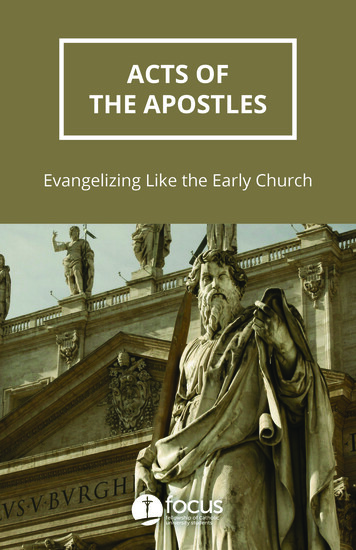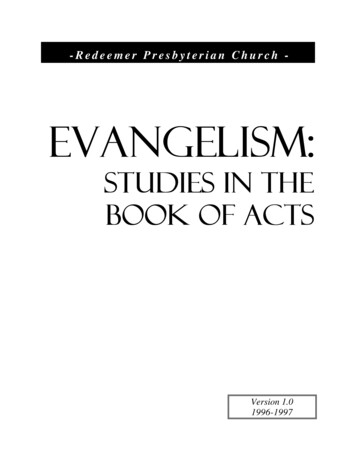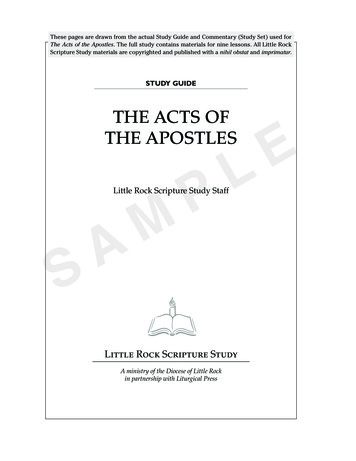
Transcription
These pages are drawn from the actual Study Guide and Commentary (Study Set) used forThe Acts of the Apostles. The full study contains materials for nine lessons. All Little RockScripture Study materials are copyrighted and published with a nihil obstat and imprimatur.study guideTHE ACTS OFTHE APOSTLESPLittle Rock Scripture Study StaffSMAELLittle Rock Scripture StudyA ministry of the Diocese of Little Rockin partnership with Liturgical Press
Dear Friends in Christ,SELThe Bible comes to us as both a gift and an opportunity. It is a gift of God who loves us enough to communicate with us. The only way to enjoy the gift is to open andsavor it. The Bible is also an opportunity to actually meetGod who is present in the stories, teachings, people, andprayers that fill its pages.I encourage you to open your Bibles in anticipationthat God will do something good in your life. I encourageyou to take advantage of the opportunity to meet God inprayer, study, and small-group discussion.Little Rock Scripture Study offers materials that aresimple to use, and a method that has been tested by time.The questions in this study guide will direct your study,help you to understand the passages you are reading,and challenge you to relate the Scriptures to your ownlife experiences.Allow the Word of God to form you as a disciple ofthe Lord Jesus. Accept the challenge to be “transformedby the renewal of your mind” (Romans 12:2). Above all,receive God’s Word as his gift, and act upon it.MAPSincerely in Christ,W J. Peter SartainBishop of Little Rock
Sacred ScriptureEL“The Church has always venerated the divine Scriptures just asshe venerates the body of the Lord, since from the table of both theword of God and of the body of Christ she unceasingly receivesand offers to the faithful the bread of life, especially in the sacredliturgy. She has always regarded the Scriptures together withsacred tradition as the supreme rule of faith, and will ever do so. For,inspired by God and committed once and for all to writing, theyimpart the word of God Himself without change, and make thevoice of the Holy Spirit resound in the words of the prophets andapostles. Therefore, like the Christian religion itself, all the preaching of the Church must be nourished and ruled by sacred Scripture. For in the sacred books, the Father who is in heaven meetsHis children with great love and speaks with them; and the forceand power in the word of God is so great that it remains the support and energy of the Church, the strength of faith for her sons, thefood of the soul, the pure and perennial source of spiritual life.’’SMAPVatican II, Dogmatic Constitution on Divine Revelation, no. 21.INTERPRETATION OF SACRED SCRIPTURE“Since God speaks in sacred Scripture through men in humanfashion, the interpreter of sacred Scripture, in order to see clearlywhat God wanted to communicate to us, should carefully investigate what meaning the sacred writers really intended, and whatGod wanted to manifest by means of their words.“Those who search out the intention of the sacred writers must,among other things, have regard for ‘literary forms.’ For truth isproposed and expressed in a variety of ways, depending on whethera text is history of one kind or another, or whether its form is thatof prophecy, poetry, or some other type of speech. The interpretermust investigate what meaning the sacred writer intended toexpress and actually expressed in particular circumstances as heused contemporary literary forms in accordance with the situation3
4Instructionsof his own time and culture. For the correct understanding of whatthe sacred author wanted to assert, due attention must be paid tothe customary and characteristic styles of perceiving, speaking,and narrating which prevailed at the time of the sacred writer, andto the customs men normally followed in that period in their every day dealings with one another.”Vatican II, Dogmatic Constitution on Divine Revelation, no. 12.InstructionsMATERIALS FOR THE STUDYPThis Study Guide: The Acts of the ApostlesMAELBible: The New American Bible with Revised New Testamentor The New Jerusalem Bible is recommended. Paraphrasededitions are discouraged as they offer little if any help whenfacing difficult textual questions. Choose a Bible you feel freeto write in or underline.Commentary: The New Collegeville Bible Commentary, vol ume 5, The Acts of the Apostles by Dennis Hamm, S.J. (Litur gical Press) is used with this study. The abbreviations for thiscommentary, NCBC NT volume 5, and the assigned pages arefound at the beginning of each lesson.SADDITIONAL MATERIALSBible Dictionary: The Dictionary of the Bible by John L. McKenzie(Simon & Schuster) is highly recommended as a reference.Notebook: A notebook may be used for lecture notes and yourpersonal reflections.WEEKLY LESSONSLesson 1—Acts 1–2Lesson 2—Acts 3–5Lesson 3—Acts 6–8Lesson 4—Acts 9–12
InstructionsLesson 5—Acts 13–15Lesson 6—Acts 16–18Lesson 7—Acts 19–21Lesson 8—Acts 22–24Lesson 9—Acts 25–28YOUR DAILY PERSONAL STUDYS5ELThe first step is prayer. Open your heart and mind to God.Reading Scripture is an opportunity to listen to God wholoves you. Pray that the same Holy Spirit who guided the for mation of Scripture will inspire you to correctly understandwhat you read and empower you to make what you read apart of your life.The next step is commitment. Daily spiritual food is as nec essary as food for the body. This study is divided into dailyunits. Schedule a regular time and place for your study, as freefrom distractions as possible. Allow about twenty minutes aday. Make it a daily appointment with God.As you begin each lesson read the assigned chapters ofScripture found at the beginning of each lesson, the footnotesin your Bible, and then the indicated pages of the commentary.This preparation will give you an overview of the entire lessonand help you to appreciate the context of individual passages.As you reflect on Scripture, ask yourself these four questions:MAP1. What does the Scripture passage say?Read the passage slowly and reflectively. Use your imagina tion to picture the scene or enter into it.2. What does the Scripture passage mean?Read the footnotes and the commentary to help you under stand what the sacred writers intended and what Godwanted to communicate by means of their words.3. What does the Scripture passage mean to me?Meditate on the passage. God’s Word is living and powerful.What is God saying to you today? How does the Scripturepassage apply to your life today?
6Instructions4. What am I going to do about it?Try to discover how God may be challenging you in thispassage. An encounter with God contains a challenge toknow God’s will and follow it more closely in daily life.THE QUESTIONS ASSIGNED FOR EACH DAYELRead the questions and references for each day. The questionsare designed to help you listen to God’s Word and to prepareyou for the weekly small-group discussion.Some of the questions can be answered briefly and objectively by referring to the Bible references and the commentary(What does the passage say?). Some will lead you to a betterunderstanding of how the Scriptures apply to the Church,sacraments, and society (What does the passage mean?). Somequestions will invite you to consider how God’s Word challenges or supports you in your relationships with God andothers (What does the passage mean to me?). Finally, the questions will lead you to examine your actions in light of Scripture(What am I going to do about it?).Write your responses in this study guide or in a notebookto help you clarify and organize your thoughts and feelings.SMAPTHE WEEKLY SMALL-GROUP MEETINGThe weekly small-group sharing is the heart of the Little RockScripture Study Program. Participants gather in small groupsto share the results of praying, reading, and reflecting on Scripture and on the assigned questions. The goal of the discussionis for group members to be strengthened and nourished individually and as a community through sharing how God’s Wordspeaks to them and affects their daily lives. The daily studyquestions will guide the discussion; it is not necessary to discuss all the questions.All members share the responsibility of creating an atmosphere of loving support and trust in the group by respectingthe opinions and experiences of others, and by affirming andencouraging one another. The simple shared prayer which be-
Instructions7gins and ends each small group meeting also helps create theopen and trusting environment in which group members canshare their faith deeply and grow in the study of God’s Word.A distinctive feature of this program is its emphasis on andtrust in God’s presence working in and through each member.Sharing responses to God’s presence in the Word and in otherscan bring about remarkable growth and transformation.THE WRAP-UP LECTUREELThe lecture is designed to develop and clarify the themes ofeach lesson. It is not intended to be the focus of the group’sdiscussion. For this reason, the lecture always occurs after thesmall group discussion. If several small groups meet at onetime, the groups may gather in a central location to listen tothe lecture.Lectures may be presented by a local speaker. They are alsoavailable on DVD, VHS, or CD.SMAP
LESSON 1Acts 1–2NCBC-NT vOLumE 5, pagES 5–22Day 1EL1. What do you hope to gain from this study of the Acts of theApostles?2. a) How does the opening of Acts reveal its relationship to theGospel we know as Luke (Acts 1:1-2)? (See Luke 1:1-4.)Pb) What is Luke’s purpose in writing a sequel to his Gospel(1:1-2)?3. The apostles ask Jesus about restoring the kingdom to Israel.How does his response prepare the reader for the major eventsof the book of Acts? (1:6-8)Day 2SMA4. What categories does Luke use to identify the three differentgroups of people gathered in the upper room (1:13-14)?5. Compare Luke’s account of Judas Iscariot’s death in Acts(1:16-19) with Matthew’s. (See Matt 27:3-10.) In what do theyagree or disagree?6. a) What were the requirements for the replacement for Judas(1:21-22)? (See 3:15; 10:37-43.)b) Why was it important to replace Judas (1:15-26)? (See Luke22:29-30.)8
Lesson 1—Acts 1–2SMAP9EL
10Lesson 1—Acts 1–2Day 37. a) How was the coming of the Holy Spirit identified (2:2-4.)?b) How does the Christian Pentecost reverse the punishmentat the Tower of Babel? (See Gen 11:1-9: Eph 4:3-13.)EL8. What does it mean to be “filled with the Holy Spirit” (2:4)? (See1:5; 2:38; Luke 3:16; Rom 5:5; Eph 1:13.)9. What do we know about the content of the message being proclaimed by those who were speaking in tongues (2:11)?Day 4P10. How does the speaking in tongues described here (2:4-13) differ from the “tongues” Paul writes about? (See 1 Cor 14:1-11.)MA11. How does Peter explain the group’s strange behavior (2:15-21)?(See Joel 3:1-5.)12. What are the essential details about Jesus that Peter chooses toproclaim to “you who are Israelites” (2:22-36)?S
Lesson 1—Acts 1–2SMAP11EL
12Lesson 1—Acts 1–2Day 513. a) What message about Jesus does Peter find in Psalm 16:8-11(Acts 2:25-33)?b) What is the message about Jesus in Psalm 110:1 (Acts2:34-36)?EL14. In what way does Peter’s speech to his fellow Israelites hintthat the Gentiles might also come to share in the gift of theHoly Spirit (2:39)?15. a) What does Peter say is required of those who would receivethe Holy Spirit (2:37-38)? (See 10:48; Rom 6:3; 1 Cor 1:13.)Pb) Is there any other way? (See 10:44-48.)Day 6MA16. a) How does Luke describe the way of life of the new believers(2:42-47)?b) How might the Holy Spirit be leading modern believers tolive more as these early believers did?S17. What did the apostles and the early believers in Christ do topreserve their identity as Jews (2:46)? (See 3:2-3.)18. Have you experienced the excitement in the Holy Spirit described of the first Christians (2:11-13, 46-47)? (See Gal 5:22-23;Eph 3:16-19; Col 1:11-12.)
Lesson 1—Acts 1–2SMAP13EL
SMAPEL
VOLUME 5NEw TEsTaMENTtHenew collegevillebible commentaryPELThe AcTs of TheAposTlesMAD e n n i s H a mm, S . J .SS e r i e S e D i to rDaniel D u r ke n , o. S. B .LITURGICAL PRESSCollegeville, Minnesotawww.litpress.org
SMAPEL
TExT AND COMMENTARyThe Acts of the ApostlesI.The Preparation for theChristian MissionThe Promise of the Spirit. 1In thefirst book, Theophilus, I dealt withall that Jesus did and taught 2until theday he was taken up, after giving instructions through the holy Spirit to theapostles whom he had chosen. 3He presented himself alive to them by many1MAELproofs after he had suffered, appearingto them during forty days and speakingabout the kingdom of God. 4While meeting with them, he enjoined them not todepart from Jerusalem, but to wait for“the promise of the Father about whichyou have heard me speak; 5for JohnP THE RISEN CHRISTAND THE RESTORATION OF ISRAEL IN JERUSALEMSActs 1:1–8:3Luke shows how Jesus’ mission to initiate the end-time restoration ofIsrael finds expression in the emergent, Spirit-filled Christian communityin Jerusalem.1:1-5 Introduction: “As I was saying,Theophilus . . .”Luke introduces this sequel to his Gospel by addressing Theophilus,as he did in the prologue to his Gospel (Luke 1:1-4), indicating that this isa continuation of the same project described there. Literally, the Greek ofverse 1 says, “I dealt with all that Jesus began to do and teach,” implyingthat Acts will treat what Jesus continues to do and teach through the apostolic church. And the phrase “through the holy Spirit” more naturallymodifies “chosen”—that is, “after giving instructions to the apostleswhom he had chosen through the holy Spirit.” For Luke, alone among theSynoptic writers, notes that Jesus chose the Twelve after spending thenight in prayer (Luke 6:12-13), which for Luke often precedes a special This symbol indicates a cross reference number in the Catechism of the Catholic Church. Seepage 130 for number citations.11
Acts 1:6-11baptized with water, but in a few daysyou will be baptized with the holySpirit.”The Ascension of Jesus. 6Whenthey had gathered together they askedhim, “Lord, are you at this time goingto restore the kingdom to Israel?” 7Heanswered them, “It is not for you toknow the times or seasons that theFather has established by his own authority. 8But you will receive powerwhen the holy Spirit comes upon you,and you will be my witnesses in Jerusalem, throughout Judea and Samaria,and to the ends of the earth.” 9When hehad said this, as they were looking on,he was lifted up, and a cloud took himfrom their sight. 10While they werelooking intently at the sky as he wasgoing, suddenly two men dressed inwhite garments stood beside them.11They said, “Men of Galilee, why areyou standing there looking at the sky?This Jesus who has been taken up fromP S1:6-12 The ascension of JesusSince the disciples are Jews who have identified Jesus as their longawaited Messiah, it is reasonable for them to ask if Jesus will now restorethe kingdom to Israel (v. 6). After all, he has been speaking to them forforty days about the kingdom of God, which, in the common expectationof the day, is supposed to be a restoration of the nation to what it waswhen David reigned a millennium before. Jesus does not deny the appropriateness of the question; he simply refuses to reveal to them the divinelydecreed schedule (v. 7). Jesus also reinterprets their implied notion of thekingdom; it is not going to be a matter of nationalism but a new kind of12 ELempowerment by the Spirit (see Luke 3:21, leading to 4:18; Acts 1:14, leading to 2:1-4; and Acts 4:23-31).As in the Gospel, the centerpiece of Jesus’ teaching remains the kingdom of God. Jesus’ reference to “the promise of the Father” alludes to atleast three passages in the Third Gospel: (1) Luke 11:13: “If you then, whoare wicked, know how to give good gifts to your children, how muchmore will the Father in heaven give the holy Spirit to those who ask him?”;(2) Luke 12:32: “Do not be afraid any longer, little flock, for your Father ispleased to give you the kingdom”; (3) Luke 24:49: “And [behold] I amsending the promise of my Father upon you; but stay in the city until youare clothed with power from on high.” The gift of the Spirit at Pentecostwill also signal a further manifestation of the kingdom of God already inaugurated in the ministry of Jesus (see Luke 11:20 and 17:21).Linking this blessing with John the Baptist’s prophecy about being“baptiz[ed in] the holy Spirit” (Luke 3:16) also ties this promise to Ezekiel’s promise of a cleansing restoration of the people of Israel that willaccompany the gift of the divine Spirit (Ezek 36:24-27).MA
Acts 1:12-13you into heaven will return in the sameway as you have seen him going intoheaven.” 12Then they returned to Jerusalem from the mount called Olivet,which is near Jerusalem, a sabbathday’s journey away.The First Community in Jerusalem.When they entered the city they wentto the upper room where they werestaying, Peter and John and Jamesand Andrew, Philip and Thomas, Bartholomew and Matthew, James son of13ELunity empowered by the holy Spirit, as foreshadowed by the new “family” portrayed in Luke 8:1-21.In this, Jesus echoes what he had said to them on Easter Sunday (Luke24:49). When he tells them that the Spirit’s power will enable them to behis witnesses from Jerusalem “to the ends of the earth” (v. 8), he alludes toIsaiah 49:6, where the Lord tells his Servant that he will not only restorethe tribes of Jacob but will also be a light to the nations, “that my salvationwill reach to the ends of the earth.”Although the traditional word for the withdrawal of Jesus’ physicalpresence from the apostles is “the ascension,” it might be more accurate todescribe Luke’s description of this event as an “assumption,” since the author portrays it as an act of the Father. To describe this departure, Lukedraws upon the biblical traditions about the assumptions of Enoch (Gen5:23-24; Sir 49:14b) and Elijah (2 Kgs 2:9-11; Sir 48:9). To interpret the event,he adds what have been called “apocalyptic stage props”—the movementupward into the heavens, a cloud as vehicle, and the interpreting angels.This is Luke’s second account of the ascension. The first account, givenat the end of Luke’s Gospel (24:50-51), sets the event on Easter Sundayand describes Jesus in details that recall the description of the high priestSimon II in Sirach 50:1-24. Like Simon, Jesus’ presence occasions worship(Sir 50:17, 22); he raises his hands and pronounces a blessing (Sir 50:20),and this is followed by references to the community’s blessing God andrejoicing in the temple (Sir 50:22-23). In so doing, Jesus is acting like thetemple priest at the end of the daily Whole-Offering (also called the Tamid,or “regular,” service; Exod 29:38-42; Num 2:1-10). And within the Gospelnarrative, Jesus is doing what the priest Zechariah was unable to do at theend of the Tamid service, whose incense ritual is the scenario briefly portrayed at the beginning of Luke’s Gospel. By alluding in this manner toSirach 50, Luke was celebrating Jesus the way Ben Sira celebrated SimonII as the climax of his Praise of the Ancestors (Sirach 44–50). For Luke, it isJesus, not Simon II, who is the climax of Israel’s history; and so Lukechooses to end his first volume by portraying Jesus’ departure on EasterSunday with those overtones.SMAP13
Acts 1:14-19Alphaeus, Simon the Zealot, and Judasson of James. 14All these devoted themselves with one accord to prayer, together with some women, and Marythe mother of Jesus, and his brothers.The Choice of Judas’s Successor.15During those days Peter stood up inthe midst of the brothers (there was agroup of about one hundred andtwenty persons in the one place). Hesaid, 16“My brothers, the scripture hadto be fulfilled which the holy Spiritspoke beforehand through the mouthof David, concerning Judas, who wasthe guide for those who arrested Jesus.17He was numbered among us and wasallotted a share in this ministry. 18Hebought a parcel of land with the wagesof his iniquity, and falling headlong, heburst open in the middle, and all his insides spilled out. 19This became knownto everyone who lived in Jerusalem, soELWhy, then, does Luke take the liberty to narrate this event so differently as he begins his second volume? Some scholars suggest that in ActsLuke has expanded the time frame of Luke 24 to the round (and biblicallysymbolic) number forty, in order to associate the ascension closely withthe outpouring of the Spirit on the fiftieth day, Pentecost (the Jewish feastof the giving of the Law on Mount Sinai). The apocalyptic stage propsserve four purposes: (1) to recall the transfiguration (Luke 9:18-36, anothermountain episode, when the disciples could not pray, as now they can);(2) to look forward to the outpouring of the Spirit and the mission thatfollows; (3) to recount the departure of Jesus in a way that recalls 2 Kings2:9-12 (another narrative about the transmission of spirit for propheticsuccession); and (4) to point toward the final coming (described already inLuke 21:27 as coming “in a cloud,” alluding to the cloud imagery of Daniel 7:13, but in the singular, to prepare for Acts 1:9). Thus Luke is able tospeak of one reality, the final departure of Jesus from his assembled followers, from two interpretive points of view. Luke 24 alludes to the ascension as a fitting ending of the story of Jesus; Acts 1 narrates the same eventas the beginning of the story of the mission of the Church, initiated by therisen Lord and empowered by the gift of the Spirit. SMAP1:13-26 The community gathers to restore “the Twelve” by electingMatthiasThe apostles (minus Judas Iscariot) whom Luke had carefully called“the eleven” at Luke 24:33 gather with the “women, and Mary the motherof Jesus, and his brothers” (v. 14). This group, numbered at 120 in verse 15(notice the multiple of 12), comprises the nucleus of the church that willbecome the heart of restored Israel in chapter 2.“The women” no doubt included Mary Magdalene, Joanna, Susanna,and Mary the mother of James, and the many other women who had ac14
Acts 1:20-26that the parcel of land was called intheir language ‘Akeldama,’ that is,Field of Blood. 20For it is written in theBook of Psalms:‘Let his encampment becomedesolate,and may no one dwell in it.’And:‘May another take his office.’Therefore, it is necessary that one ofthe men who accompanied us thewhole time the Lord Jesus came and21went among us, 22beginning from thebaptism of John until the day on whichhe was taken up from us, become withus a witness to his resurrection.” 23Sothey proposed two, Joseph calledBarsabbas, who was also known as Justus, and Matthias. 24Then they prayed,“You, Lord, who know the hearts of all,show which one of these two you havechosen 25to take the place in this apostolic ministry from which Judas turnedaway to go to his own place.” 26ThenPELcompanied Jesus and the Twelve and had “provided for them out of theirresources” (Luke 8:3). They are the ones “who had come from Galilee withhim” (Luke 23:55) and, coming to anoint the body of Jesus in the tomb,discovered it empty and became the first witnesses to the resurrection(Luke 24:10, 22-23).His “brothers” are the very ones who, together with Jesus’ mother,were last seen in Luke 8:19-21, standing at the edge of a crowd aroundJesus when he said, “My mother and my brothers are those who hear theword of God and act on it” (v. 21). Whatever the ambiguity of their statusthen, now they are at the center of the believing community. Like Jesusafter the water immersion by John and before his special anointing by theSpirit (Luke 3:21), the community is immersed in prayer.Jesus’ prayer that Simon Peter, even after denying Jesus, will turn backand strengthen his brothers (Luke 22:32) begins to be fulfilled, as Peternow asserts his leadership (Acts 1:15).The first agenda item to be addressed by the community is the replacement of Judas Iscariot, who had been “numbered” among the core group(v. 17). Because of the symbolic meaning of Jesus’ choice of twelve, indicating the restoration of the twelve tribes of the people of God, “theeleven” (Luke 24:33) must again become the Twelve.The importance of the number twelve becomes clear when one recallsthe words of Jesus at the Last Supper: “And I confer a kingdom on you,just as my Father has conferred one on me, that you may eat and drink atmy table in my kingdom; and you will sit on thrones judging the twelvetribes of Israel” (Luke 22:29-30). Whatever Matthew’s parallel saying maymean in the context of his Gospel (Matt 19:28), for Luke this is a referenceto the leadership of the Twelve in the Jerusalem church after Pentecost.SMA 15
Acts 2:1-10they gave lots to them, and the lot fellupon Matthias, and he was countedwith the eleven apostles.The Coming of the Spirit. 1Whenthe time for Pentecost was fulfilled,they were all in one place together. 2Andsuddenly there came from the sky anoise like a strong driving wind, and itfilled the entire house in which theywere. 3Then there appeared to themtongues as of fire, which parted andcame to rest on each one of them. 4Andthey were all filled with the holy Spiritand began to speak in different tongues,as the Spirit enabled them to proclaim.2Now there were devout Jews fromevery nation under heaven staying inJerusalem. 6At this sound, they gatheredin a large crowd, but they were confused because each one heard themspeaking in his own language. 7Theywere astounded, and in amazementthey asked, “Are not all these peoplewho are speaking Galileans? 8Then howdoes each of us hear them in his ownnative language? 9We are Parthians,Medes, and Elamites, inhabitants ofMesopotamia, Judea and Cappadocia,Pontus and Asia, 10Phrygia and Pamphylia, Egypt and the districts of LibyaMA5PEL“Judging” here has the sense it has in the book of Judges, which featurestwelve charismatic leaders who led the tribes of Israel before the time ofthe monarchy. The reconstituted Twelve will similarly “judge” (that is,exert Spirit-filled leadership among) the reconstituted people of Israelafter Pentecost.The way the words of Peter (1:16-20) and the prayer of the community(1:24-25) speak of Judas’s death is full of irony. Abandoning a communitythat will soon express its unity and detachment from material possessionsby selling fields, with no one calling anything his own, Judas invested hisblood money in a field (“turned away . . . to his own place,” v. 25) anddied there in a horrible, isolated death. Whereas Matthew’s account ofJudas’s death (Matt 27:5) parallels the suicide-by-hanging of David’s betrayer Ahithophel (2 Sam 17:23), Luke’s version reflects the punitivedeath-by-falling that was Antiochus IV’s end (2 Macc 9:12-14).The community makes sure that Judas’s replacement will be a qualified witness to the resurrection by choosing two candidates who werepresent with Jesus from the baptism of John through the ascension. Then,having done their human best, they put the final choice out of their hands,leaving it up to God through the device of casting lots. Thus Matthias ischosen to restore the Twelve. S2:1-13 The coming of the SpiritPent cost s (literally “fiftieth”) is the Greek name for the Israelite feastof Weeks (Shavu ot in Hebrew). The second of the three classical pilgrimfeasts of Israel—Unleavened Bread/Passover, Weeks, and Booths (see16The Upper Room, traditional site of the Last Supper
SMAPEL
Acts 2:11-14near Cyrene, as well as travelers fromRome, 11both Jews and converts to Judaism, Cretans and Arabs, yet we hearthem speaking in our own tongues ofthe mighty acts of God.” 12They were allastounded and bewildered, and said toone another, “What does this mean?”But others said, scoffing, “They havehad too much new wine.”13II.The Mission in JerusalemPeter’s Speech at Pentecost. 14ThenPeter stood up with the Eleven, raisedhis voice, and proclaimed to them,ELExod 23:14-17; 34:22; Deut 16:16)—the feast of Weeks was called “Fiftieth”in Greek because it occurred seven weeks, or fifty days, after the feast ofUnleavened Bread/Passover. Originally an agricultural feast celebratingthe end of the grain harvest, Pentecost eventually came to be associatedwith the giving of the Law at Sinai.Luke narrates the Pentecost events in words and images that evoke therevelation at Mount Sinai. The reconstituted Twelve (among the 120) aregathered like the twelve tribes at Sinai. The sounds from heaven, the filling of the whole house (like the shaking of the whole mountain in Exodus19:18), and the fire recall the theophany (appearance of God) at Sinai. Thetongues of fire symbolize the reality that the powerful presence of God(like fire) will find expression in human words, the prophetic ministry ofthe disciples. The appearance of fire also corresponds to John the Baptist’sprediction that Jesus would baptize “with the holy Spirit and fire” (Luke3:16). In the fuller sweep of the narrative, the parallel between Jesus andMoses is evident in that Jesus ascends with a cloud (1:9) and then mediates the gift of the prophetic word of God to the people (2:4, 11, 18, 33).Thus Luke underscores the fact that on the feast of the giving of the Law(the privileged communication of God’s word) comes the end-time gift ofthe holy Spirit to empower a fresh expression of the divine word in theministry of the apostles.The list of nations from which the Jewish pilgrims and converts comesymbolizes the future implications of what is happening here. By highlighting this inclusive gathering, Luke proclaims that this is in fact thefulfillment of the expected end-time ingathering of Israel. The Pentecostalgift is destined for Jews first, but then also for the “ends of the earth” (Acts1:8), “those far off” (2:39; see Isa 57:19).When Luke says that they “were confused because each one heard themspeaking in his own language” (v. 6, emphasis added), he appears to bealluding to the story of the tower of Babel (in its Septuagint version, thati
study guide THE ACTS OF THE APOSTLES Little Rock Scripture Study Staff Little Rock Scripture Study A ministry of the Diocese of Little Rock in partnership with Liturgical Press These pages are drawn from the actual Study Guide and Commentary (Study Set) used for The Acts of the Apostles. The full
